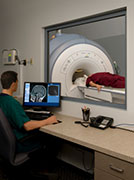Personalized approach could eliminate trial-and-error, hasten critical time to treatment
TUESDAY, Sept. 22, 2015 (HealthDay News) — Functional magnetic resonance imaging (fMRI) might someday help psychiatrists quickly determine which antipsychotic drugs work best for patients with schizophrenia or bipolar disorder, according to research published online Aug. 28 in The American Journal of Psychiatry.
Anil Malhotra, M.D., director of psychiatry research at the Zucker Hillside Hospital in New York City, and colleagues at the Feinstein Institute for Medical Research in Manhasset, N.Y., used fMRI brain scans to develop a measurement of how well two regions of the brain communicate with each other. The level of communication correlated partly with how well psychotic patients improved when they took certain antipsychotic drugs. The researchers tried out the strategy on a group of 41 patients, aged 15 to 40, experiencing their first episode of acute psychosis. The patients underwent brain scans before they were randomly assigned to take risperidone or aripiprazole for a year.
Using information gained from that trial, the researchers tested their technique in 40 patients hospitalized for psychotic illness. Seventy-six percent of the time, the investigators successfully predicted the response of the second group of patients to drug treatments.
The researchers said they hope to improve that number to 80 percent. “We were close to these goals with the current work and are now looking to launch additional research in this area to hopefully increase this signal to those levels,” Malhotra told HealthDay.
Full Text (subscription or payment may be required)
Copyright © 2015 HealthDay. All rights reserved.








